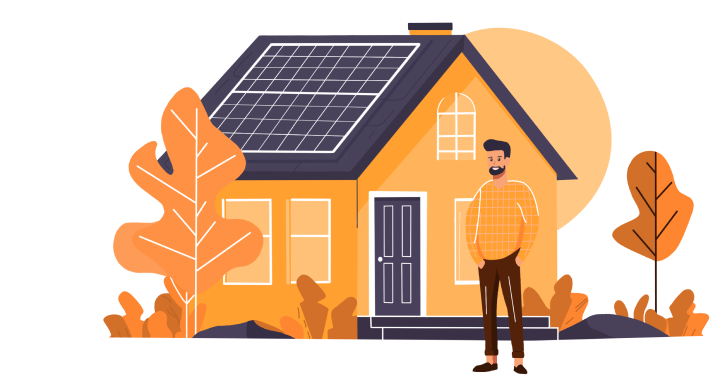Solar panels and installation are transforming how we harness energy, but understanding the process and potential savings can be daunting. At Solar Energy Host, we simplify this journey, offering you a direct path to sustainable energy solutions. By connecting with top local providers, you can receive competitive quotes and see exactly how much you could save.
Whether you're curious about the costs, the installation process or the efficiency of solar panels for your home, we're here to provide clear, empowering guidance.
Step #1: Assess your roof's suitability.
Before you install solar power, evaluate your roof's ability to support them. You can hire a professional to check for damage and assess the structural integrity, especially if you have materials like slate or tile that may pose challenges.
Ensure the roof is still in good condition to avoid future complications with solar panel setup. Additionally, the optimal orientation in the Northern Hemisphere is south-facing, but east and west may also work with efficiency adjustments. Use adjustable mounts if the roof's pitch is not ideal, and conduct a sun study to check for potential shading issues for your solar panels and installation plans.
Step #2: Research on local regulations.
Understand the zoning laws, community restrictions and homeowners association guidelines in your area. Homes in historic districts may require additional approvals. Familiarize yourself with the permitting process, expected costs and the timeline for obtaining permits to ensure your solar panel system meets all local safety and quality standards.
Step #3: Calculate your energy needs.
Review your household's energy consumption by analyzing a year's worth of energy bills to determine your annual energy usage. This helps in planning the size and quantity for when you buy solar panels.
Calculate your daily energy consumption and use local solar irradiance data to determine how many peak sun hours your location receives. This calculation will guide you in deciding the total kW capacity needed before you begin installing solar panels.
Step #4: Consider potential obstructions.
Evaluate any nearby trees or structures that might block sunlight from reaching your home solar panels. Plan for the potential growth of trees and future constructions that could cast shadows. Consider the flexibility in your solar installation to adjust or relocate panels if significant shading occurs in the future.
Considering potential obstructions can also help you determine what type of panels you should get. Monocrystalline solar panels are more efficient and perform better in low light but are more expensive. Polycrystalline solar panels, on the other hand, are significantly cheaper but less efficient and need more space.
Step #5: Choose the right solar panel installer.
Gather and compare quotes from multiple solar company installers to ensure competitive pricing and quality service through Solar Energy Host. Go through our breakdown of costs, including equipment and labor, and compare the expected performance of solar panels and installation methods based on your specific situation.
With us, you can be sure your chosen solar panel company is certified, experienced and uses reputable brands so you can get the most out of the advantages of solar panels.
Frequently Asked Questions (FAQ)
What is the installation process for solar panels?
The typical installation process of solar panels, whether they're grid-tied solar panels or off-grid solar panels, involves several systematic steps:
- Site evaluation and measurements: Your chosen solar panel company will assess the site, checking roof condition and sun exposure to determine optimal panel placement.
- Permitting: Get necessary local permits to ensure compliance with building and electrical codes. A solar installer can typically assist with this step as well.
- Installation of mounts and panels: Scaffolding is set up, mounts are installed on the roof, and solar panels are securely attached to these mounts.
- Wiring and connection: Electrical wiring connects the panels to your home's power system and the grid.
- Inspection and activation: Local authorities inspect the solar panels and installation. Once approved, the system is activated for power generation.
How do I protect my solar panels from extreme weather?
Protecting solar panels and installation from extreme weather involves several strategies. Ensuring a robust installation with high-quality mounts that can withstand high winds and storms is crucial. Some solar panels also come with protective coatings that help resist damage from hail and heavy rain.
Regular maintenance is important; this includes checking for any damage after significant weather events and performing regular cleaning and inspection to keep the panels in optimal condition. Additionally, it is advisable to keep trees trimmed around your home to minimize the risk of branches falling on your solar panels during storms.
Do solar panels require regular inspections?
Regular inspections after the installation of solar panels are crucial for maintaining the efficiency and longevity of solar panels. It is advisable to have your solar panels inspected at least once a year by a professional to identify and fix any issues such as loose wiring, dirt accumulation or shading from new obstructions.
Additionally, after any severe weather, it's wise to perform a visual inspection to check for visible damage or debris. Many solar systems come equipped with monitoring software that alerts you to any drops in performance, which can also indicate when an inspection might be necessary.
These regular checks help ensure that your solar panels continue to function efficiently and last longer, maximizing your energy output.
About Solar Energy Host
At Solar Energy Host, we're your trusted ally in the journey towards sustainable living with solar panels and installation support. Our platform is designed to simplify the process of choosing solar energy, making it straightforward and hassle-free. We connect you with top local solar installation companies, allowing you to receive competitive quotes effortlessly.
With Solar Energy Host, you're not just going to have someone install a solar panel—you're investing in a future of serious savings and environmental stewardship. Our commitment to security, transparency and support ensures that every step of your solar transition is clear and beneficial.
Get competitive quotes delivered to you so you can get one step closer to your solar panels and installation plans!














